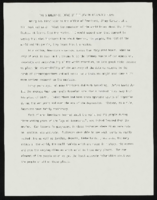Search the Special Collections and Archives Portal
Search Results
Video footage of interviews with Joe Frank and Gary Rosenthal, 2013
Level of Description
Archival Collection
Collection Name: Generations of the Shoah - Nevada Records
Box/Folder: Digital File 00
Archival Component
Midbar Kodesh Temple: presentation board, approximately 1990 to 2000
Level of Description
Archival Collection
Collection Name: Domingo Cambeiro Corporation Architectural Records
Box/Folder: Box 09
Archival Component
Pop-up banner traveling exhibit panels, 2020
Level of Description
Archival Collection
Collection Name: Generations of the Shoah - Nevada Records
Box/Folder: Digital File 00
Archival Component

Transcript of roundtable interview about Kristallnacht with Esther Finder, Raymonde Fiol, Alexander Kuechel, Philipp Meinecke and Rabbi Felipe Goodman, by Barbara Tabach, March 17, 2015
Date
Archival Collection
Description
In this interview, the participants discuss their experiences during Kristallnacht, and the commemoration events in southern Nevada with Holocaust survivors and their families. Mr. Kuechel recounts his journey through concentration camps and being liberated by the Russians. Rabbi Goodman talks about meeting Mr. Meinecke, whose grandfather was a high-ranking SS officer. Meinecke discusses his upbringing in Germany and trying to learn about his family's involvement in the Holocaust, and the hope he felt after the fall of the Berlin Wall as Jews returned to Germany. The group discusses the importance of Holocaust education because there are still so many untold stories.
On November 9th to November 10th, 1938, in an incident known as Kristallnacht, Nazis in Germany torched synagogues, vandalized Jewish homes, schools and businesses, and killed close to one hundred Jews. In the aftermath of Kristallnacht, also called the Night of Broken Glass, some thirty thousand Jewish men were arrested and sent to Nazi concentration camps. German Jews had been subjected to repressive policies since 1933 when Nazi Party leader Adolph Hitler became chancellor of Germany. However, prior to Kristallnacht these Nazi policies had been primarily nonviolent. However, after Kristallnacht conditions for German Jews grew increasingly worse. During World War II, Hitler and the Nazis implemented their so-called final solution to what they referred to as "the Jewish problem" and carried out the systematic murder of some six million European Jews in what is now commonly known as the Holocaust.
Text


"The Stereotypic Image of the Jew in Hollywood Films": manuscript draft by Roosevelt Fitzgerald
Date
Archival Collection
Description
From the Roosevelt Fitzgerald Professional Papers (MS-01082) -- Unpublished manuscripts file.
Text
"Holocaust Education Seder for Clark County students and teachers" newspaper article by Esther Toporek Finder in the Las Vegas Israelite, 2014 May 02
Level of Description
Archival Collection
Collection Name: Generations of the Shoah - Nevada Records
Box/Folder: Box 01
Archival Component
"Nellis hosts Holocaust Remembrance Week," article in Bullseye, the Nellis, Creech and NTTR newspaper, volume 64 number 16, 2014 April 25
Level of Description
Archival Collection
Collection Name: Generations of the Shoah - Nevada Records
Box/Folder: Box 01
Archival Component


